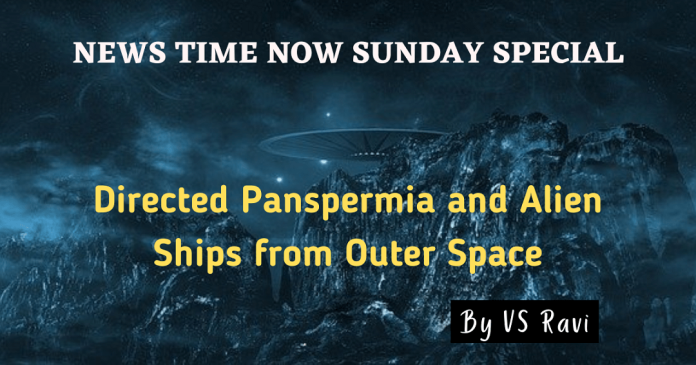The elucidation of the structure of the DNA by Crick and Watson is the greatest triumph of biology in the twentieth century. However it may come as a surprise to many people that Crick was a proponent of a theory that stands at the border of science–the theory of directed panspermia, which means “seeds everywhere” – however it was the physicist Arrhenius who at the end of the 19th century, had suggested that life on Earth had originated from space and that our world was seeded by spores of micro-organisms traveling between planets. But Crick and Orgel had felt the radiations in space were too intense for the spores to survive. So they postulated a variant of the theory in which spores were transported by an interplanetary spaceship sent by an alien civilisation!
In his short and engaging book “Life itself”, Crick explains that some basic features of cosmology, chemistry and biology were involved in the process. But he himself is aware that “directed panspermia” is stretched across the region between Science fiction and science. So Crick adopts a somewhat skeptical viewpoint, in the beginning trying to examine and refute the arguments of the theory. But gradually, once the objections were carefully lifted one by one, he feels confident to assert that directed panspermia is at least possible and, more importantly, not totally improbable. So at the end of the book he speculates with ideas like “what would they [the aliens] have sent?” and if so what was “the design of the rocket”!
He ponders over issues like what would be the mixture of chemicals required to start life de novo, and proposes a sequence that would culminate in the formation of the first replicator molecule, RNA. Though he at first had felt that the scenario is plausible because RNA is still today considered the best candidate Crick expresses his view, that it is frustrating for our present purpose as it seems almost impossible to give any numerical value to the probability of what seems a rather unlikely sequence of events.”
In his book ” Life Itself” he postulates that “At the present time we can only say that we cannot decide whether the origin of life on earth was an extremely unlikely event or almost a certainty—or any possibility in between these two extremes.”
At the same time, he rightly points out that the fact that life exists in the universe (we’re here!) does not tell us anything about the probability of life’s emergence. In other words Crick argues, that life is an extremely rare phenomenon.
Crick then speculates the likelihood that other planets in the universe may be suitable for life. He however makes a lot of assumptions, which however do not offer experimental evidence. That’s not surprising, given that no exoplanet had yet been described! Thus, after a lot of guesses, Crick comes out with an estimation of “a million planets in our galaxy on which we might hope to find oceans of thin organic soup waiting for life to get going.” Apparently, based on modern research, this number could be much higher! So Crick is probably on the safe side with his estimate. What he wants to show here, obviously, is that life could have begun on another planet than Earth.
His next move is to show that there was ample time since the beginning of the universe for another highly developed civilisation to appear. But what would such a civilisation have sent? wonders Crick. His guess: a mixture of bacteria (for example cyanobacteria) and eukaryotes (something like yeast), which can be packed by billions in a relatively small volume, and which can survive space travel better than any known organism.
Finally Crick confronts two explanations for life on Earth. In the first one, life originated on Earth from the primitive soup, without external help. The second is directed panspermia (DP). How can he decide between them? He can’t really, though he tries to grant points in different categories. For instance, Crick sees the uniformity of the genetic code as a support for DP (Directed Panspermia). Another point to support DP comes from the fossil record: the oldest fossil microbes are indeed very old and resemble cyanobacteria. However, Crick sees the absence of eukaryotes in the ancient fossil record somewhat as an argument against DP.
The speculative exercise is necessarily limited. There is no way to firmly decide between DP and the conventional theory, and most of the estimations and probability are very uncertain. Interestingly, Crick seems very aware of this fact, and he repeatedly mentions it in his book. For instance he says “The first [criticism to directed panspermia], which my wife has voiced more than once, is that it is not a real theory but merely science fiction. This is not meant as a compliment, though it might perhaps be taken that way.”
Crick’s interest in the origin of life in this post, and directed panspermia represents an interesting complement to his reflections on the possibility of life elsewhere.
But despite Crick’s defence of directed panspermia as a valid scientific theory – or at least as a premature theory that will fully expand in the future –, it is difficult not to see it as a purely speculative attempt.
An exciting, interesting idea, yes, but without a chance to be proved or disproved. And this, if we are to follow Sir Popper’s falsification test, puts it right off science’s lawn.
Directed panspermia is the deliberate transport of microorganisms into space to be used as introduced species on lifeless but habitable astronomical objects.
A second issue that has been agitating the minds of Astronomers and biologists is the possibility of advanced life forms existing elsewhere in the cosmos. Just before his death in 2018 Stephen Hawking made a startling prediction that there must be an advanced civilisation elsewhere in the universe in some distant planet, which might take over the earth, if we tried to establish contact, in response to a signal from it.
Europeans taking over America from native Americans after they had cordially received Columbus would be an appropriate analogy.
Hawking pointed out that there are 2 trillion galaxies in the universe and that even the “Milky Way” — our own galaxy — has a hundred billion stars. Therefore, he was fairly certain that an alien life form does exist even on a planet in our nearest galaxy, which is 16 light years away from the Earth (a light year is the distance travelled by light at velocity of 186,000 miles per second for a whole year), and is five times as heavy as earth.
What is more it orbits around a red dwarf that has half the mass and radius of our sun, and more importantly, it receives the same average energy as the earth does from the sun. This makes the planet’s parameters like distance and temperature ideally suited for the appearance of liquid water on its surface millions of years ago.
A primitive life form like bacteria must have emerged at that time and then the laws of evolution would have resulted in making it more advanced than us.
Hawking was of the view that the inhabitants of this planet might have exhausted all the food and other resources on their planet and would be wandering around all over space “like a nomad” in search of a hospitable planet.
And, if by chance they locate the earth by our foolishly responding to some signal from them, they would annihilate the inhabitants of our earth.
Hawking was not the first scientist to make a Cassandra-like prophecy.
Even about two decades ago, the eminent American theoretical physicist, Michio Kaku, wrote in his book Hyperspace that whenever there is a clash of unequal civilisations, the consequences are dangerous for the weaker civilisation.
He cites the example of the Aztecs of Mexico whose civilisation had risen over thousands of years to great prominence, and the full meridian of its glory.
However, because they possessed gun powder and warships, a band of 400 Spaniards were able to conquer them, ending their civilisation.
On the other hand, some astrophysicists, ask why we should be pessimistic and not hope that some friendly aliens who are extremely happy to continue to live in their own planet, merely want to visit our planet as a gesture of goodwill and friendship, instead of taking a pessimistic view, like Hawking and Kaku.


















































